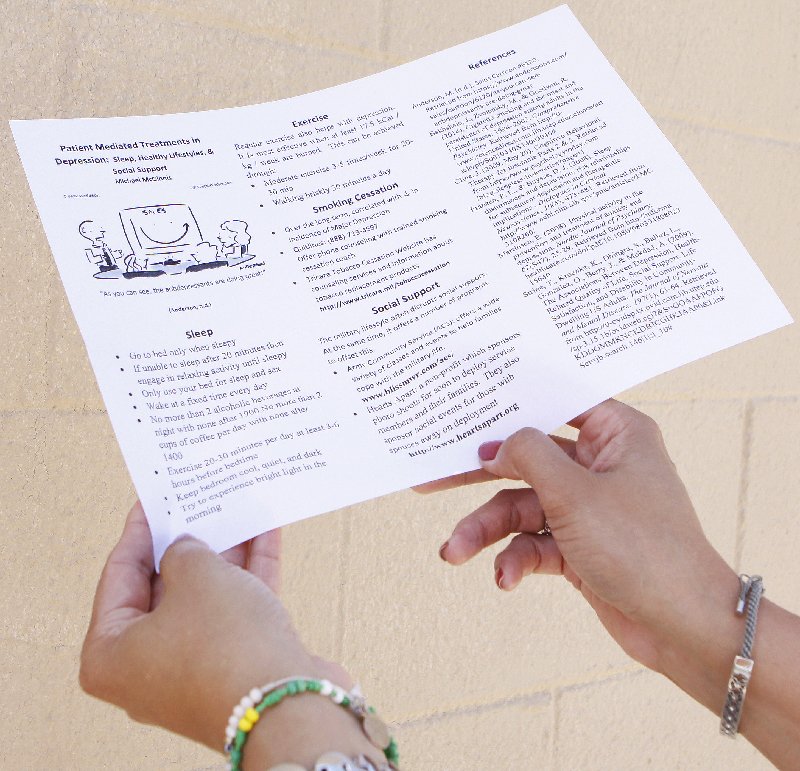Originally published July 2, 2015
By Laura L. Acosta
UTEP News Service
Before graduating from The University of Texas at El Paso School of Nursing in May 2015, Michael McGinnis was one of 91 undergraduate students who made a difference in schools, outpatient clinics, home health and quality management hospital settings throughout the community.
While completing his community rotation at the Mendoza Soldier Family Care Clinic on Fort Bliss in April, McGinnis developed a pamphlet on nonmedical interventions to treat depression for the clinic’s nurses to use with their patients.

“I wanted to find things that patients could do outside of pharmaceuticals to try to help with their depression,” said McGinnis, who has a Bachelor of Science in nursing from The University of Texas at El Paso, in addition to a bachelor’s in psychology from The University of Texas at Dallas. “One of the things I saw in the research is if patients feel like they have more self-efficacy, that helps with depression.”
The pamphlet titled, “Patient Mediated Treatments in Depression: Sleep, Healthy Lifestyles, and Social Support,” and features tips on sleep, exercise, smoking cessation and social support services to help individuals manage their depression.
“If I could tell them simple things that they can do that will affect their depression, not only will it help with the depression, but it also may increase their self-efficacy and make them feel like they have some control over their life,” McGinnis said.
McGinnis’ project was very well received by the nurses and administrators at the clinic. In May, the Department of Nursing at William Beaumont Army Medical Center informed McGinnis that his pamphlet had been incorporated in the preparedness and prevention initiatives at the Mendoza Soldier Family Care Clinic.
“I wanted my project to be something that might be useful to the nurses,” McGinnis said. “I wanted to be sure that it had relevance to what they’re doing.”
The pamphlet was McGinnis’ final project for the class, Promoting Health Along the Border. Students complete 135 hours in a community health care setting during the final semester of nursing school. As part of the class, students identify an area that could be improved in their practice settings. Students conduct research on interventions then present their recommendations to their supervisors.
McGinnis searched Google Scholar and other Internet databases for information on cigarette smoking and depression, healthy sleep habits, physical activity and depression, and social support services available to military families on Fort Bliss.
“While the students are at their clinical sites, we want them to do more than just assessments and skills,” explained Melissa Wholeben, Ph.D., UTEP clinical assistant professor and the course manager. “They need to be a community nurse in which they find a need, research how to fix the need and then present strategies to fix it. They also evaluate how well their projects were received.”
Wholeben estimates that students in the Promoting Health Along the Border class implement between 250 and 275 projects a year at different practice sites. The class is offered during the fall, spring and summer semesters.
Another project that made a difference in the community during the spring semester was called “Start Smart,” which encouraged seventh graders at Ysleta Middle School to eat a healthy breakfast.
The project was the brainchild of Jennifer Posern, who shadowed the school’s nurse as part of her community rotation in March. Posern noticed that between 8:30 and 9 a.m. every morning the nurse’s office would be flooded with students complaining about headaches and nausea.
Even though they were given fruit, yogurt, or cereal and milk during the first class, Posern noticed that the students who were not feeling well did not eat their breakfast.
“They had headaches and stomach aches and you give them some juice and some crackers and they’re fine and you send them back to class,” Posern recalled. “All they needed was to eat.”
Posern developed a PowerPoint presentation to explain how skipping breakfast affected the students’ performance at school.
“Your focus is just all over the place,” Posern said. “One of the big things that I found in the research was everything felt harder to do even if it wasn’t because you don’t have enough food and enough water.”
Students answered multiple-choice questions about healthy food choices and learned about the long-term effects of skipping breakfast.
The experience not only allowed Posern to apply her creative side, but it also solidified her decision to become a school nurse.
“Rather than being told what to eat, teenagers need to be taught to make healthy choices,” Posern said. “They need to learn what is healthy and what is unhealthy and how to choose the right things. As a school nurse, I can directly teach kids that.”
Jolande Aguilera, a school nurse at Del Valle Elementary School, has taught students from UTEP by precept for the past seven years. She works closely with the nursing students on their projects to make sure their topics are relevant to the needs of the elementary school population. Past projects include exercise, nutrition and dental health.
“They do really cool things,” Aguilera said. ”They think outside the box but it’s because that’s what I expect from them. I love (UTEP) students. They’re awesome and they are so eager to learn.”